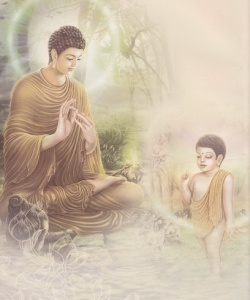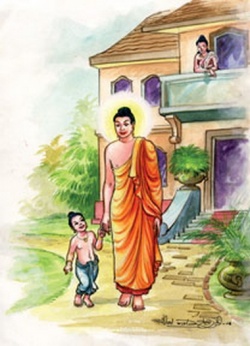Difference between revisions of "Son Rahula"
m (Text replacement - "to know" to "to know") |
m (Text replacement - "The Buddha" to "The Buddha") |
||
| Line 1: | Line 1: | ||
[[File:Buddhanew12.jpg|thumb|250px|]] | [[File:Buddhanew12.jpg|thumb|250px|]] | ||
<poem> | <poem> | ||
| − | [[Rāhula]] (born c. 534 BC) was the only son of [[Siddhartha]] [[Gautama]] ([[Pāli]] [[Siddhattha]] [[Gotama]]), later known as [[ | + | [[Rāhula]] (born c. 534 BC) was the only son of [[Siddhartha]] [[Gautama]] ([[Pāli]] [[Siddhattha]] [[Gotama]]), later known as The [[Buddha]], and his wife {{Wiki|Princess}} [[Yasodharā]]. |
Accounts of his [[Life]] differ in certain points. The following is that given in the [[Pāli Canon]]. | Accounts of his [[Life]] differ in certain points. The following is that given in the [[Pāli Canon]]. | ||
[[Life]] | [[Life]] | ||
| − | {{Wiki|Prince}} [[Rāhula]] asking [[ | + | {{Wiki|Prince}} [[Rāhula]] asking The [[Buddha]] for his inheritance, after [[Buddha]]'s [[Renunciation]]. |
{{Wiki|Prince}} [[Siddhartha]] was preparing himself to leave the palace. One account claims that when he received the news of his son's [[birth]] he replied [[Rāhu]] jāto, bandhanam jātam — "A [[rāhu]] is born, a [[Fetter]] has arisen." Accordingly the child was named [[Rāhula]], meaning "[[Fetter]]", or "impediment", recognizing that the child could be a tie that bound him to his wife [[Yashodhara]], a binding that may impede a search for [[Enlightenment]].] Others, however, [[feel]] [[rāhu]] does not mean "[[Fetter]]" in this [[sense]]. The second account, found in the [[Mūlasarvāstivāda]] [[Vinaya]], is that [[Rāhula]] received his [[Name]] in accordance with an eclipse of the [[moon]], [[caused]] by the [[snake]] [[Rahu]]. In {{Wiki|Japanese}} he is called Ragora (羅睺羅). | {{Wiki|Prince}} [[Siddhartha]] was preparing himself to leave the palace. One account claims that when he received the news of his son's [[birth]] he replied [[Rāhu]] jāto, bandhanam jātam — "A [[rāhu]] is born, a [[Fetter]] has arisen." Accordingly the child was named [[Rāhula]], meaning "[[Fetter]]", or "impediment", recognizing that the child could be a tie that bound him to his wife [[Yashodhara]], a binding that may impede a search for [[Enlightenment]].] Others, however, [[feel]] [[rāhu]] does not mean "[[Fetter]]" in this [[sense]]. The second account, found in the [[Mūlasarvāstivāda]] [[Vinaya]], is that [[Rāhula]] received his [[Name]] in accordance with an eclipse of the [[moon]], [[caused]] by the [[snake]] [[Rahu]]. In {{Wiki|Japanese}} he is called Ragora (羅睺羅). | ||
| Line 12: | Line 12: | ||
Supporting the first account, in the [[Dhammapada]], the [[Pleasure]] and [[Joy]] that a man receives in his wife and children is called a "soft [[Fetter]]" that ties {{Wiki|individuals}} to [[Life]] and [[Suffering]], not just through eventual loss and separation of loved ones but more deeply and subtly may act as ties to cyclic [[existence]] ([[Samsara]]). | Supporting the first account, in the [[Dhammapada]], the [[Pleasure]] and [[Joy]] that a man receives in his wife and children is called a "soft [[Fetter]]" that ties {{Wiki|individuals}} to [[Life]] and [[Suffering]], not just through eventual loss and separation of loved ones but more deeply and subtly may act as ties to cyclic [[existence]] ([[Samsara]]). | ||
| − | [[Rāhula]] was raised by his mother and grandfather, [[King]] [[Suddhodana]]. When he was seven years old, [[Rahula]] requested his father, missing him dearly; [[ | + | [[Rāhula]] was raised by his mother and grandfather, [[King]] [[Suddhodana]]. When he was seven years old, [[Rahula]] requested his father, missing him dearly; The [[Buddha]] returned to his home city of [[Kapilavatthu]]. On the seventh day of his return, [[Yasodharā]] took [[Rāhula]] to see his father, The [[Buddha]]. She told [[Rāhula]] that since his father had renounced the palace [[Life]] and as he was the next royal {{Wiki|prince}} in line, he should ask his father for his inheritance of crown and [[treasure]] for his future sake when his grandfather would no longer rule the kingdom. |
[[File:Oday-03.jpg|thumb|250px|]] | [[File:Oday-03.jpg|thumb|250px|]] | ||
| − | After the meal, [[Rāhula]] followed [[ | + | After the meal, [[Rāhula]] followed The [[Buddha]], saying "Give me my inheritance." Nobody tried to stop him, nor did The [[Buddha]] prevent him from following him. He then looked at his father and said, "[[Lord]], even your shadow is pleasing to me." |
| − | Reaching the Park of Nigrodha, where [[ | + | Reaching the Park of Nigrodha, where The [[Buddha]] was staying, The [[Buddha]] [[Thought]] to himself: "He [[Desires]] his father's inheritance, but it is wrought with troubles. I shall give him the benefit of my [[Spiritual]] [[Enlightenment]] and make him an owner of a [[transcendental]] inheritance." |
| − | [[ | + | The [[Buddha]] called [[Venerable]] [[Sariputta]] and asked him to ordain little [[Rāhula]] who became the first Sāmanera ([[novice]] [[Monk]]). |
| − | "The [[King]], discovering that now his grandson and a number of young men in the royal family had requested [[Ordination]], asked [[ | + | "The [[King]], discovering that now his grandson and a number of young men in the royal family had requested [[Ordination]], asked The [[Buddha]] only to ordain a minor with the consent of his [[Parents]] or guardian. The [[Buddha]] assented. This rule was expanded to include the spouses of those intending to join the [[Order]] of [[Monks]] and [[Nuns]]. |
| − | Shortly after Rāhula's [[Ordination]] [[ | + | Shortly after Rāhula's [[Ordination]] The [[Buddha]] taught him the importance of telling the [[Truth]]. This {{Wiki|discourse}} is known as the Rahulovada [[Sutta]]. The [[Buddha]] placed [[Truth]] as the highest of all [[virtues]]. The seekers of [[Truth]], (those who have as their goal [[Nibbana]]) should not break the [[precept]] of [[Truth]]. |
| − | [[Rāhula]] subsequently became one among the many arhants through following [[ | + | [[Rāhula]] subsequently became one among the many arhants through following The [[Buddha]]'s teachings. |
| − | [[Rāhula]] [[died]] before [[ | + | [[Rāhula]] [[died]] before The [[Buddha]], [[Sariputta and Moggallana]]. |
Other accounts | Other accounts | ||
In the [[Mūlasarvāstivāda]]-[[Vinaya]], used by [[Tibetan]] [[Buddhists]], it is claimed that [[Rāhula]] was conceived on the evening of the [[Renunciation]], and born six years later, on the day that his father achieved [[Enlightenment]] (which is also said to coincide with a lunar eclipse). Also see "[[Rahu]]," a [[Hindu]] [[Asura]] and [[Dharmapala]]. | In the [[Mūlasarvāstivāda]]-[[Vinaya]], used by [[Tibetan]] [[Buddhists]], it is claimed that [[Rāhula]] was conceived on the evening of the [[Renunciation]], and born six years later, on the day that his father achieved [[Enlightenment]] (which is also said to coincide with a lunar eclipse). Also see "[[Rahu]]," a [[Hindu]] [[Asura]] and [[Dharmapala]]. | ||
| − | [[Mahayana]] Sources: in the [[Lotus Sutra]], [[Shakyamuni]] predicts that [[Rahula]] will become a [[Buddha]] named "Treader on Seven-Jeweled [[Lotuses]] [[Tathagata]]". In the following verse section he says, "In [[worlds]] to come, [[seeing]] [[infinite]] kotis of [[Buddhas]], to all he will be eldest son and with all his [[mind]] seek [[ | + | [[Mahayana]] Sources: in the [[Lotus Sutra]], [[Shakyamuni]] predicts that [[Rahula]] will become a [[Buddha]] named "Treader on Seven-Jeweled [[Lotuses]] [[Tathagata]]". In the following verse section he says, "In [[worlds]] to come, [[seeing]] [[infinite]] kotis of [[Buddhas]], to all he will be eldest son and with all his [[mind]] seek The [[Buddha]]-way. Of the hidden course of [[Rahula]] only I am able to know" (Chapter IX). |
</poem> | </poem> | ||
{{W}} | {{W}} | ||
Revision as of 17:08, 12 September 2013
Rāhula (born c. 534 BC) was the only son of Siddhartha Gautama (Pāli Siddhattha Gotama), later known as The Buddha, and his wife Princess Yasodharā.
Accounts of his Life differ in certain points. The following is that given in the Pāli Canon.
Life
Prince Rāhula asking The Buddha for his inheritance, after Buddha's Renunciation.
Prince Siddhartha was preparing himself to leave the palace. One account claims that when he received the news of his son's birth he replied Rāhu jāto, bandhanam jātam — "A rāhu is born, a Fetter has arisen." Accordingly the child was named Rāhula, meaning "Fetter", or "impediment", recognizing that the child could be a tie that bound him to his wife Yashodhara, a binding that may impede a search for Enlightenment.] Others, however, feel rāhu does not mean "Fetter" in this sense. The second account, found in the Mūlasarvāstivāda Vinaya, is that Rāhula received his Name in accordance with an eclipse of the moon, caused by the snake Rahu. In Japanese he is called Ragora (羅睺羅).
Supporting the first account, in the Dhammapada, the Pleasure and Joy that a man receives in his wife and children is called a "soft Fetter" that ties individuals to Life and Suffering, not just through eventual loss and separation of loved ones but more deeply and subtly may act as ties to cyclic existence (Samsara).
Rāhula was raised by his mother and grandfather, King Suddhodana. When he was seven years old, Rahula requested his father, missing him dearly; The Buddha returned to his home city of Kapilavatthu. On the seventh day of his return, Yasodharā took Rāhula to see his father, The Buddha. She told Rāhula that since his father had renounced the palace Life and as he was the next royal prince in line, he should ask his father for his inheritance of crown and treasure for his future sake when his grandfather would no longer rule the kingdom.
After the meal, Rāhula followed The Buddha, saying "Give me my inheritance." Nobody tried to stop him, nor did The Buddha prevent him from following him. He then looked at his father and said, "Lord, even your shadow is pleasing to me."
Reaching the Park of Nigrodha, where The Buddha was staying, The Buddha Thought to himself: "He Desires his father's inheritance, but it is wrought with troubles. I shall give him the benefit of my Spiritual Enlightenment and make him an owner of a transcendental inheritance."
The Buddha called Venerable Sariputta and asked him to ordain little Rāhula who became the first Sāmanera (novice Monk).
"The King, discovering that now his grandson and a number of young men in the royal family had requested Ordination, asked The Buddha only to ordain a minor with the consent of his Parents or guardian. The Buddha assented. This rule was expanded to include the spouses of those intending to join the Order of Monks and Nuns.
Shortly after Rāhula's Ordination The Buddha taught him the importance of telling the Truth. This discourse is known as the Rahulovada Sutta. The Buddha placed Truth as the highest of all virtues. The seekers of Truth, (those who have as their goal Nibbana) should not break the precept of Truth.
Rāhula subsequently became one among the many arhants through following The Buddha's teachings.
Rāhula died before The Buddha, Sariputta and Moggallana.
Other accounts
In the Mūlasarvāstivāda-Vinaya, used by Tibetan Buddhists, it is claimed that Rāhula was conceived on the evening of the Renunciation, and born six years later, on the day that his father achieved Enlightenment (which is also said to coincide with a lunar eclipse). Also see "Rahu," a Hindu Asura and Dharmapala.
Mahayana Sources: in the Lotus Sutra, Shakyamuni predicts that Rahula will become a Buddha named "Treader on Seven-Jeweled Lotuses Tathagata". In the following verse section he says, "In worlds to come, seeing infinite kotis of Buddhas, to all he will be eldest son and with all his mind seek The Buddha-way. Of the hidden course of Rahula only I am able to know" (Chapter IX).

